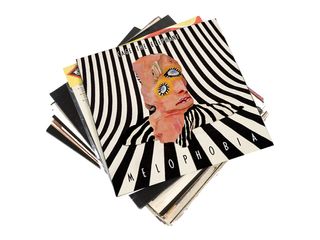
Cage The Elephant's Matt & Brad Shultz talk Melophobia track-by-track
“You don’t really write a song," says Cage The Elephant lead singer Matt Shultz. "You let a song find you.”
Sage words, but such a realization was hard in coming for Shultz, his guitarist brother Brad, and the rest of Cage The Elephant (bassist Daniel Tichenor, guitarist Lincoln Parish and drummer Jared Champion) during the making of their forthcoming third album, which they tellingly titled Melophobia, the definition of which is "the fear of music."
“We did have a lot of fears to overcome," admits Brad. "We kind of didn't know what we had as we were making the record, and we had to understand and accept a lot of things about ourselves. And there were definitely times when things got tense. It all came to a head one day when Matt and I got into a fight – there was pushing and shoving. But you have to experience the conflict to get over it. You put everything on the table and move on. Out of fighting, we were forced to understand what we were trying to achieve, and that was to make great music."
As Matt reveals, going into the writing of Melophobia, the band enjoyed their first real time off in five years of working nonstop, a period that allowed them to experiment individually with song ideas that they ultimately brought to their rehearsal cabin in Portland, Tennessee. "It was a good time for growing," he says, "but by being apart, we all formed pretty strong visions on our own about which directions the album should move in. When we got back together, we all had different views."
For Brad, part of the process of marrying those opposing views came from a personal epiphany he had while recording: “When we go to make a record, I’m empty. I have absolutely nothing. I always try to find things that will inspire me. Sometimes that inspiration came from other bands, but on this record, I didn’t have that – I wasn’t listening to anything. My mind was blank; I was starting from scratch. That can be scary, but that’s where the best stuff comes from. You just have to be willing to go there, and that's what I did."
As they did on their first two releases (2008's self-titled debut and 2011's Thank You, Happy Birthday), Cage The Elephant worked with Jay Joyce, the Nashville-based producer whom Matt considers to be something of an unofficial sixth member of the band. “Jay is the type of guy who never lets you see the magic that he works," says Matt. "It all just appears on the tracks. He always has a new way of pulling stuff out of us that we never knew we had, or he pushes us further than we ever thought we could go. Sometimes that’s frustrating, but the results are always worth it.”
According to Brad, the album's triumphs (and they are many) ultimately stem from a commitment to embracing musical purity. "When we first came out and had success, some of the blogs wrote us off as some kind of radio band," he says. "I’d be lying if I said I didn’t have a chip on my shoulder about that. Our music has always come from an honest place, and that's especially true now. We never write songs just to get on the radio. We want every song to take you to a new place. I think we got there on the new album."
Cage The Elephant's Melophobia will be released on October 8th. You can pre-order the album at iTunes and on Amazon. On the following pages, Matt and Brad Shultz walk us through the record track-by-track.
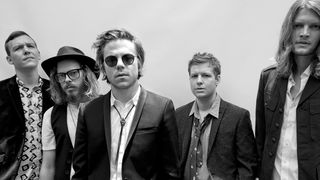
Spiderhead
Brad Shultz says, “It started from a simple riff that I had – you can hear it during the verse. This was one of the ‘struggle songs’ for us. We probably wrote four different choruses for this one; we just didn’t want to settle. We didn’t want to assume that the first thing was always the right thing. I never want to say that we took the easy way out on this record.
“If you’ve ever had that feeling where you had to convince yourself that something is the right thing, then you know it’s not the right thing. It’s hard to come to that realization, too. As an artist, you want to love everything that you do. But there’s a fine line between loving something and convincing yourself to love it.
“I wasn’t being influenced during the writing or recording of Spiderhead. Matt has been getting into Bowie, so that could be there maybe, although I can’t speak for him. As for myself, I just wanted to write a riff that I really loved. But that was the hardest thing – trying to dream up that one thing that I could be honestly excited about.”

Come A Little Closer
Matt Shultz says, “We in the Buenos Aires airport, and I saw this amazing flamenco guitarist who was busking. He had this whole gypsy thing going on. The music he played was very hypnotic and powerful – you could hear the burdens of his heart. I got inspired and grabbed my guitar. I went to the next terminal – there weren’t that many people in this one yet – and I started playing what in my head was Bulgarian folk.
“I wrote the verse at the airport, inspired by the thought of things appearing different at first and then seeing them in a new light. We went on to San Paulo, and I remember being in my hotel and looking out one morning at this makeshift city on a hill. There were tarps and scrap metal, all of these little boxes with people inside of them. It made me think of an ant hill, but then I also thought, ‘No, wait, these are people living their lives.’ It made me want to look closer. That became the chorus.
“Once I showed the parts to the band, we went to a rehearsal studio, pieced everything together, and there was the song. But it all started in that airport in Buenos Aires. Funny how that works sometimes.”
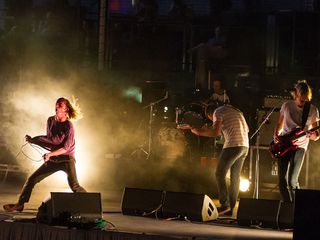
Telescope
Matt Shultz says, “I was sitting around with a couple of friends, and I started to have these revelations about songwriting. What struck me was, the more you try to distance yourself from that honest, bare moment of creativity in order to cater to cool or to look artistic, the further you’re going to get from what really matters, that initial moment of inspiration. What comes first is probably what’s right.
“I was hanging out with a younger band, and I told them, ‘You just start it. That’s how a song happens.’ So I grabbed a guitar, like, ‘Hey, let me show you,’ and I wrote the chorus to Telescope right there.
“It was a long winter and I was in a heavy-hearted place. The band was apart, and there were a lot of unspoken adversities. I reflected a lot on purpose and the value of life. In five years of being on the road, I’d never had a house, and now I finally had one. I got really obsessed with decorating, all of this tedious toil that was ultimately in vain, because I was alone.
“I didn’t know what to do with myself. I would go from room to room to room just to feel like each room had a purpose. I’d find myself staring at a blank TV screen, overwhelmed by this feeling of imminent doom. Finally, I got the idea of writing a song about what it would be like if I could watch myself from outside myself. I thought about watching myself from a telescope from another galaxy, just thinking, ‘Wow… that’s sad!’” [Laughs]

It's Just Forever (featuring Alison Mosshart)
Brad Shultz says, “I’ve always been in love with old surf music, and I think that came through when I started writing this riff.
“We wanted to write a story about two people who were so in love that it was almost creepy. It was important to have a girl telling her part of the story, and because we’ve always been fans of Alison Mosshart, she was the one who came to mind to do the girl part of the duet. Luckily, we were able to snag her. [Laughs]
“We’ve been playing this song live, and it’s a real blast. We wanted to push ourselves with this one. The different time signatures are tricky, but it all works. We’re thrilled at how everything came together.”

Take It Or Leave It
Matt Shultz says, “We have a rehearsal cabin in Portland, Tennessee, which if you know anything about Portland, Tennessee, you know that only about 10 people live there. One day, the band was in the cabin, and Brad started playing this little guitar thing. Pretty soon, Jared started playing drums to it. Everyone jumped in and the song started to happen. It was one of those ‘light-bulb’ moments.
“I’d hardly been listening to any music while we were working on the record, but I would go bowling, and when I did, I would play Blondie on the jukebox. That song Heart Of Glass was my favorite. It made me want to do a super-playful type of vocal delivery.
“We put together the verse, but the chorus didn’t want to come to us – that was always a big problem with the song. We cut the track in the studio, but there was still no chorus. After a while, we started to get really down in the dumps, because at first this was the most promising song of all, and now it was just sitting there.
“One morning, I woke up in my living room. I picked up the guitar and the whole thing poured out. I literally sped down to Nashville to get to the studio to show it to the guys. We jumped right in and recorded it that day. Sometimes these things happen when they’re gonna happen, and you just have to be patient.”
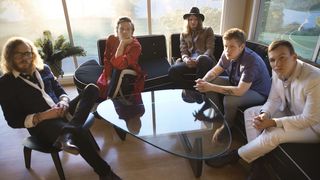
Halo
Matt Shultz says, “This was a guitar riff that Lincoln had written while we were still touring on the last record. It was a really cool chord progression, but we felt that it needed a little more movement. Lincoln and I got to the writing space a little early one day, and we were sitting on a porch swing, just conversing about what to do. We decided to double-time the guitar; it would be 16th notes.
“We went to where the band was practicing, and everybody kind of fell into it. The vocal melody happened over time, though. I really got into Christmas music for some strange reason. I just think that the chord arrangements and vocal melodies in Christmas music are pure genius. So that’s where I went with the vocal melody for Halo – it’s inspired by listening to Christmas music.
“I wanted to write about something that you struggle with and battle to get away from, but I wanted to make it sound like it’s about a relationship, even though it’s not. It’s about these vices that plague us. In the chorus, it says, ‘I lost my halo’ – I was thinking about that point in life where you feel you’re innocent… I don’t even know if you recognize it as innocent – you just don’t see your shortcomings. And then you fall on your face in a big way, and you realize that you look foolish.”
“There have been some things that I’ve done in the past couple of years that I’m not proud of at all. The song is about those things that continuously come back to haunt you.”

Black Widow
Brad Shultz says, “I have a thing about brass, so I’ve wanted to have horns for a while. Matt is on the other side of that; he was never a big horn fan at all. We definitely have different opinions on that subject.
“This was one of the songs that led to our big argument. He just didn’t share the vision I had for the horns. When we did it and it worked out, it turned out to be a really pleasant surprise.”

Hypocrite
Brad Shultz says, “This is the oldest song we had. When we first started writing it, it was more of a punky kind of Wreckless Eric thing. I felt like it had the potential to be more than a rough-around-the-edges punk song. I didn’t get Matt’s vision for it at first. We sort of learned to trust each other on this album – the whole band did, too.
“We agreed to a ‘let’s-try-everything’ approach, and we started doing it with a drum beat that Jared had, which was more off-kilter and unique.
“The horns worked out by accident. The part was actually from another song. We were working in two different studios in Jay’s building, which allowed us to do things on separate songs at the same time. There was some sort of file mix-up on Jay’s computer, and it wound up loading the horns from another song onto Hypocrite. Jay was like, ‘What is that? There’s some sort of noise coming from somewhere that shouldn’t be on this song.’
“We started muting stuff and taking things away, and we realized that it was the horn parts. But they didn’t just work out OK – they sounded beautiful. They were in the pocket in such a good way; it was like we couldn’t have done such a thing even intentionally. It was a gift from God or something.” [Laughs]
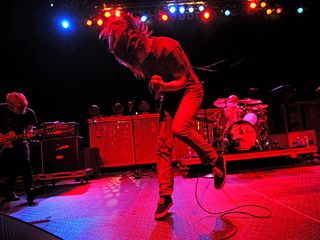
Teeth
Matt Shultz says, “I've talked about how we had our own visions for the album we wanted to make. I had more of an inner-directed, subtle thing in mind, whereas Brad wanted something that was vibrant and had grit and bite to it. This was one of the riffs that he had been messing around with. He brought it into the writing space one day, and we jumped on it.
“The lyrics were inspired by a cartoon character. I forget his name – he was a cat – but he’d say things like, ‘Terrificy thennn.’ [Editor’s note: Snagglepuss.] The character had this cool posture that I wanted to take on in my vocal delivery.
“The song is about feeling the energy of music changing. There’s a real exciting scene going on in Nashville with a bunch of bands. It carries a familiar nostalgic sentiment, but at the same time everybody’s trying to do something different. So Teeth is about the vibrancy of life and how things are changing.
“There’s this overwhelming need that some people have – they want to cater to cool or feed a certain image; either that or they try to write to sound artistic or intellectual. What’s best is when you’re transparent, standing there naked and just pouring your heart out. This song is like a letter to myself, telling myself that it’s OK to be honest.
“The spoken-word part that happens at the end came about after I talked to some friends about the creative process. I was talking about writing lyrics just to sound poetic rather than speaking from your heart. My friend said that I should stop writing lyrics for the sake of poetry, and I should just write lyrics the way that I speak, because that’s what's poetic.
“At first, I was kind of offended, but he was right. I did this experiment where I had my friends come over, and we’d crack open a bottle of wine and sit down with a typewriter. I told them to just speak from their hearts, and I tell you, I felt like a therapist – they would be weeping in my living room. Those words came out of that experiment. I’d pull lines from the things that they told me, various phrases that I’d embellish. It was pretty powerful.”

Cigarette Daydreams
Brad Shultz says, “This is a song that Matt had written and had played to me on his phone. He was talking about maybe using it for something other than Cage, but I was an instant fan of the song. This was a moment of realization like, ‘Why do we have to write Cage The Elephant songs? We can just write songs, regardless of what style of music they might be.’
“I like the idea of doing things that people might not expect from us. So we decided to take a whole new approach to writing, and this song is a good example of that. It’s just about being honest.
“I’m really happy about how we came through the process and opened ourselves up to new ways of accepting any kind of song. This one almost fell through the cracks, but here it is.”

Joe is a freelance journalist who has, over the past few decades, interviewed hundreds of guitarists for Guitar World, Guitar Player, MusicRadar and Classic Rock. He is also a former editor of Guitar World, contributing writer for Guitar Aficionado and VP of A&R for Island Records. He’s an enthusiastic guitarist, but he’s nowhere near the likes of the people he interviews. Surprisingly, his skills are more suited to the drums. If you need a drummer for your Beatles tribute band, look him up.
Most Popular








